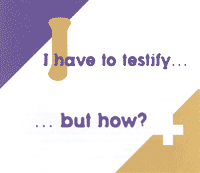What to Expect if You are a Witness in a Trial
(The Government of South Africa)
Summary

Every witness is important
- The court must return a fair verdict and witnesses are therefore essential.
- By testifying, you enable the court to act reasonably and fairly.
- You have to appear in court in person.
- It is best to arrive at court half an hour before the proceedings start.
- Inform the public prosecutor immediately that you are present.
- Ask the public prosecutor to read through your statement.
- If anything important is not in your statement, you should tell the public prosecutor.
- It often happens that witnesses have to wait before they are called to testify:
- You are not allowed to attend the court case in which you will be testifying.
- You have to wait outside.
- You must be present until you are excused by the prosecutor or the magistrate.
- You should not discuss the case concerned with other witnesses.
- Before you testify, you have to take an oath or solemnly affirm that your testimony will be truthful.
- You will be questioned by the public prosecutor.
- You may only address the court.
- The correct form of address in a lower court (for example the Magistrates' Court) is "Your Worship" and "My Lord" in higher courts (like the High Court).
- You may only testify on facts that are within your knowledge and will be guided by the prosecutor.
- Evidence told to you by someone else is inadmissible.
- You may also be questioned by the accused or his legal representative. You must listen carefully and address your answers to the court. Stay calm and do not argue with the court, the lawyer or the prosecutor.
- It is also possible that the court (Magistrate or Judge) may want to question you.
- Speak clearly and audibly throughout.
- If the accused pleads guilty, the court may pronounce judgement without hearing any evidence. The public prosecutor will inform you if you don't have to testify.
- You needn't be scared of testifying.
- You can be protected against intimidation.
- If you fear intimidation or are at any time threatened, you must report it to the public prosecutor or the investigating police officer.
- In court, the presiding officer will ensure that you are not intimidated or questioned unreasonably.
- If your testimony takes a long time and you become tired or indisposed, you have to inform the court.
- If you are a minor (under 21) you may be assisted in court by a parent or guardian or another adult.
- You are entitled to payment of a prescribed fee in certain instances.
- This is not compensation for your testimony.
- It is intended to limit the witness's expenses due to court attendance and, in certain instances, loss of income.
- If you believe that you qualify for such a payment, the public prosecutor must certify that you attended court, after which you have to report to the clerk of the court concerned to receive payment.
- If you don't know where to go or have any queries, you may approach the witness friends.
- If the witness friend is not present, you may approach the clerk of the court.
Thank you for your willingness to assist the court in the execution of its functions. Without your co-operation justice would not prevail.
The content on this page was last updated on 15 March 2014


